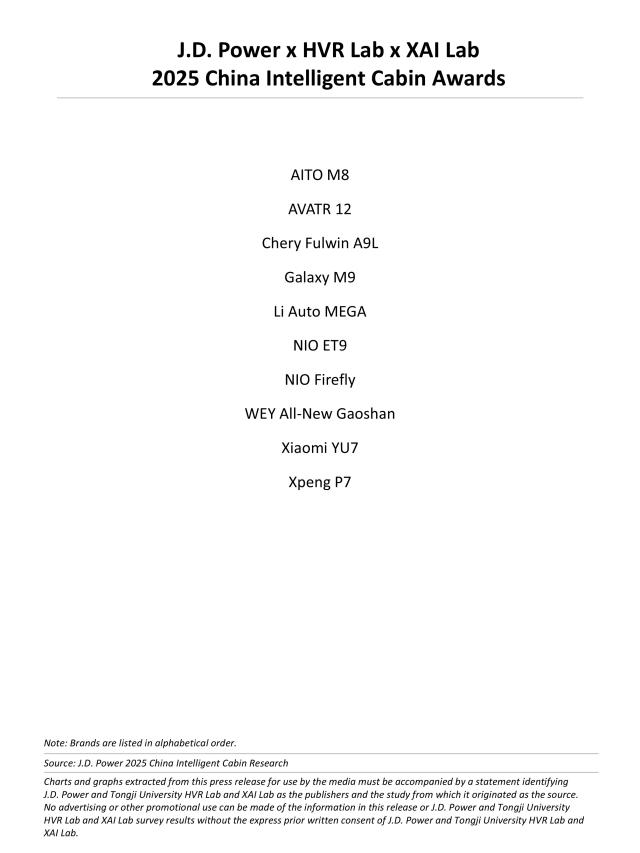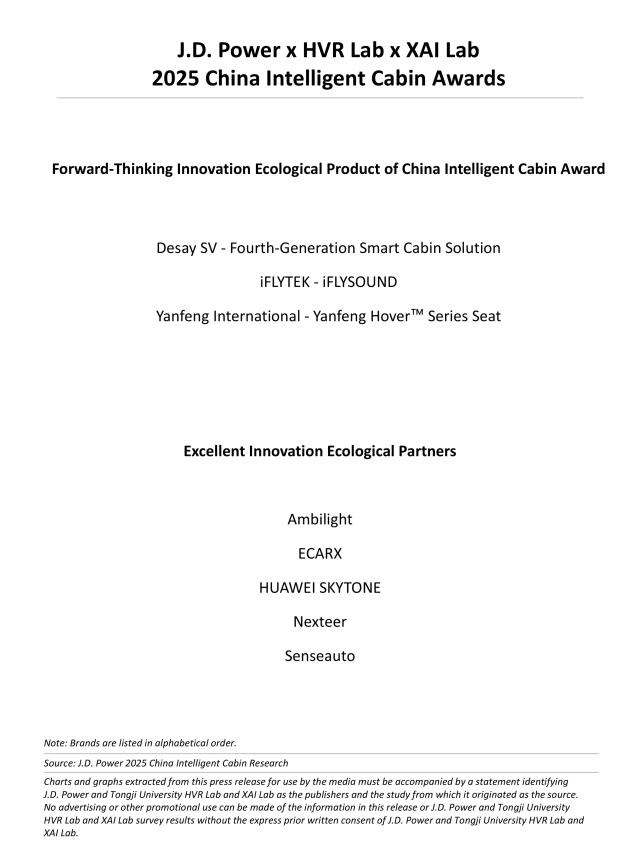Intelligent Cabin Experience Shifts to Practicality, JD Power Finds
AI Trustworthiness and Scenario Capabilities Become the New Battleground
SHANGHAI: 27 Nov. 2025 — JD Power, Tongji University Human-Vehicle Relationship (HVR) Lab and eXtraordinary AI (XAI) Lab have jointly released research into intelligent vehicle cabins in China in 2025 and have announced the recipients of this year’s China Intelligent Cabin Awards (CICA). In this year’s evaluation, vehicles scored an average of 622 points (on a 1,000-point scale)—with several top-performing models approaching 700 points, demonstrating strong capabilities in multimodal HMI (Human Machine Interface) interaction, artificial intelligence (AI)-based intent interpretation, complex command recognition and first-token response speed.
Launched in 2022, the China Intelligent Cabin Awards have been conducted for four consecutive years. Amid rapid advances in AI, the 2025 awards introduce updated evaluation dimensions and methodologies, adopting the Intelligent Cabin Innovation Index (1,000-point scale). The framework features a scientifically structured hierarchy consisting of the HMI Performance Index (50%) and AI Performance Index (50%). Both indices are calculated through a combination of HMI functional modules plus user satisfaction scores and AI capability dimensions plus user satisfaction scores, with calibrated weighting to ensure comprehensive and accurate assessment.
JD Power Intelligent Cabin Research also finds that in 2025, intelligent cabins in China have begun to shift toward pragmatism. Competitive focus is moving away from the breadth of features and toward the depth of experience. The next stage of intelligent cabin development is clear: early functional cabins focused on online services, followed by perceptual cabins that integrated multimodal interaction and sensing for rule-based automation. Now, the deep application of large models signals the arrival of the cognitive cabin era. In this era, the intelligent cabin can accurately understand user behavior and preferences, proactively provide personalized services such as dining or music recommendations and allow for the evolution from passive response to autonomous cognition.
Following are additional findings of the 2025 research:
Interaction returns to rationality: Touchscreens remain dominant (importance mean score: 4.17/5, on a 5-point scale), but users’ demand for physical buttons is almost equally strong (4.11/5). A notable 25.3% of users consider the lack of dedicated buttons for frequently used functions a major interaction flaw—showing that in high-load driving scenarios, tactile feedback remains irreplaceable. Future HMI design must strike a long-term balance across touch control, physical buttons and multimodal coordination.
Use of utility applications surpasses social applications: Although 80.2% of users frequently use OEM apps weekly, their needs clearly lean toward utility-based features. Charging services (4.23/5, on a 5-point scale) and vehicle health management (4.24/5) rank far above community interaction (3.81/5) and in-app shopping services (3.87/5). Automakers’ push to build apps as social platforms diverges from users’ task-oriented expectations.
AI experience shifts: Users value AI features that enhance travel efficiency and safety, such as intelligent congestion-avoidance navigation (4.27/5) and health monitoring (4.22/5), whereas creative features often highlighted in marketing—such as AI image generation or poetry writing —score significantly lower (each with 3.87/5). Additionally, 56.5% of users have reduced their use of AI-based vehicle controls due to reliability and safety concerns. The industry must overcome challenges in complex scenarios, multimodal coordination and intent correction to move from user perceptions of demonstrative intelligence to stable and trustworthy intelligence.
Data quality and scenario definition become core differentiators: With large model capabilities becoming widely available, the industry is witnessing clear functional homogenization. Competition is now shifting from model size to data quality, scenario granularity and depth of adaptation. Automakers must build an integrated scenario: a data–model loop to achieve model-as-application, enabling differentiated experiences in real-world usage.
- Depth of experience becomes a key purchase driver: Consumers’ willingness to pay for comfort-related hardware—such as intelligent seats and advanced audio systems—is rising, making experiential depth a core value anchor for the future intelligent cabin. At the same time, the interaction paradigm of intelligent vehicles is transitioning rapidly from a passive response tool to an active cognitive partner. Instead of waiting for user triggers, systems will leverage sensor integration, behavioral insights and contextual understanding to anticipate needs and deliver proactive services.
China Intelligent Cabin Awards
AITO M8; AVATR 12; Chery Fulwin A9L; Galaxy M9; Li Auto MEGA; NIO ET9; NIO Firefly; WEY All-New Gaoshan; Xiaomi YU7; Xpeng P7[1]
Forward-Thinking Innovation Ecological Product of China Intelligent Cabin Award
Desay SV - Fourth-Generation Smart Cabin Solution; iFLYTEK - iFLYSOUND; Yanfeng International - Yanfeng Hover™ Series Seat[2]
Excellent Innovation Ecological Partners
Ambilight; ECARX; HUAWEI SKYTONE; Nexteer; Senseauto[3]
To learn more about the JD Power 2025 China Intelligent Cabin Awards, please contact us: china.marketing@jdpa.com
About JD Power
JD Power is a global leader in consumer insights, advisory services and data and analytics. Those capabilities enable JD Power to help its clients drive customer satisfaction, growth and profitability. Established in 1968, JD Power has offices serving North America, Asia Pacific and Europe. For more information, please visit china.jdpower.com or stay connected with us on JD Power WeChat and Weibo.
About Tongji University Human-Vehicle Relationship (HVR) Lab and eXtraordinary AI (XAI) Lab
Tongji University is recognized as a "Double First-Class" initiative university and part of the "211 Project" and "985 Project" for higher education excellence in China. HVR Lab and XAI Lab leverage the research resources of Tongji University's School of Automotive Studies and College of Design and Innovation, and specializes in the research, design and evaluation of automotive intelligent experiences. It holds significant influence in both academia and industry.
Media Relations Contacts
Wenjing Ji, JD Power; China; +86 21 8026 5719; wenjing.ji@jdpa.com
Joe LaMuraglia, JD Power; USA; 001-714-621-6224; media.relations@jdpa.com
About JD Power and Advertising/Promotional Rules www.jdpower.com/business/about-us/press-release-info
[1] Brands are listed in alphabetical order.
[2] Brands are listed in alphabetical order.
[3] Brands are listed in alphabetical order.

